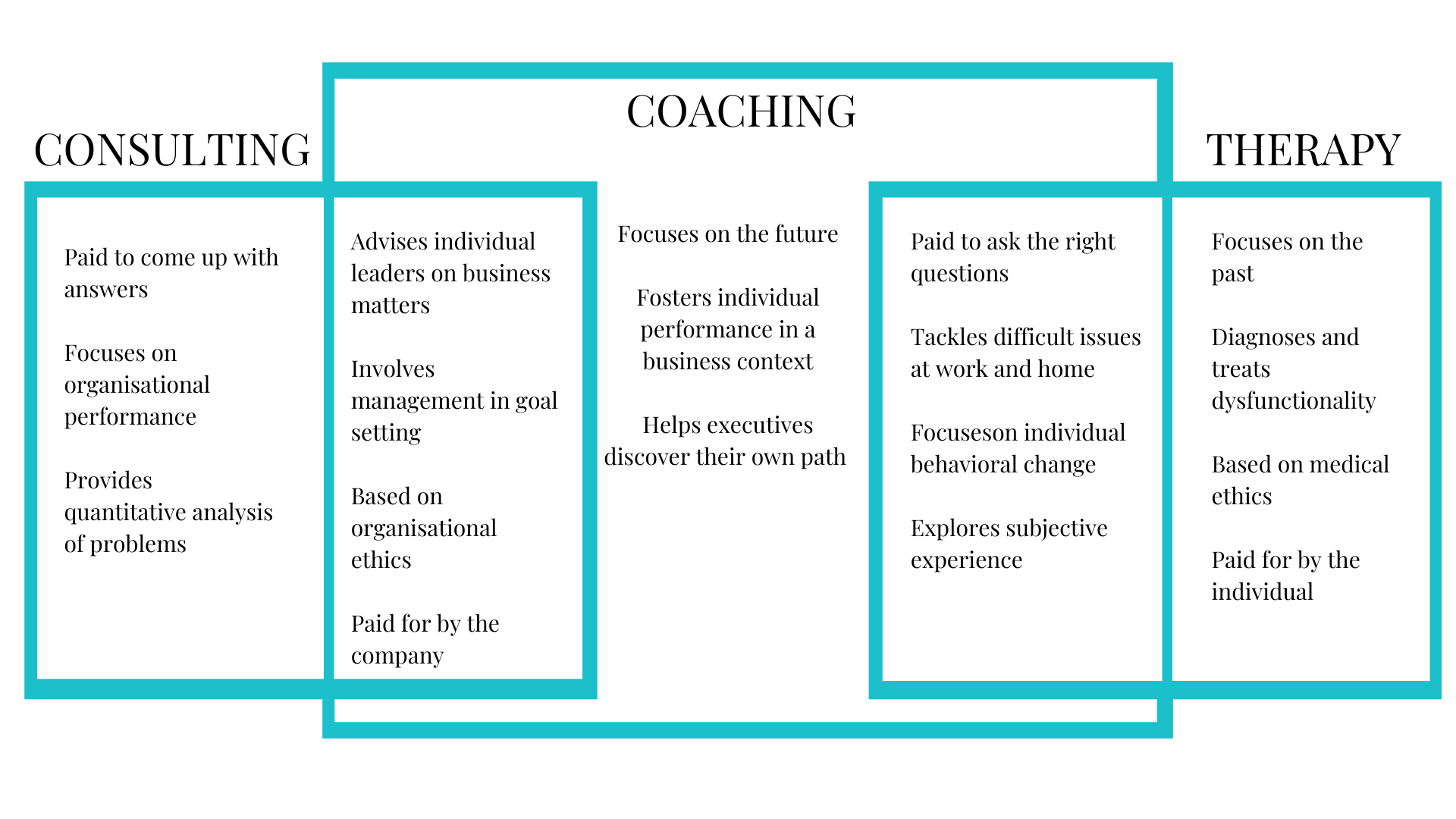The Difference Between Mentoring, Therapy, Consultancy and Coaching

By Teresa Peters.
We hear the word ‘coaching’ a lot! But what exactly is it?
Coaching is a useful way of developing people's skills and abilities, and of boosting performance. It can also help to deal with issues and challenges before they become major problems. At the heart of coaching is a creative and thought-provoking process that supports individuals to confidently pursue new ideas and alternative solutions with greater resilience.
The International Coaching Federation (ICF) defines coaching as:
‘Partnering with clients in a thought-provoking and creative process that inspires them to maximise their personal and professional potential.’
I often describe what coaching is by using a car metaphor to complement my coaching practice ‘Accelerator Coaching’.
The Difference Between Mentoring, Therapy, Consultancy and Coaching
The Mentor will share his experiences of driving cars and the wisdom and lessons he has learned in his rich experience with them. A bit like a driving instructor!
The Therapist will help you find out what might be holding you back from driving the car. They will delve into your past to discover what kinds of experiences you have had with your car so you can liberate yourself before driving one now. They will explore what is stopping you from getting into the car in the first place and then help to fix the problem.
The Consultant will bring you an owner’s manual and tell you everything you ever wanted to know about the workings of the car, the theory of driving, and an action plan. They’ll tell you what fuel to use, what colour car to drive, and how fast to go. The consultant will then leave you and may return six months later to see how you have managed the actual driving part.
The Coach will seat you in the car, place themselves in the passenger seat and encourage, endorse, acknowledge and be your thinking partner until you develop your own sustainable driving style and feel confident enough to go it alone. They will reflect and raise your self-awareness. They’ll listen in a safe, confidential space and by asking questions, will help you to get from where you are now to your perfect destination much faster than you would do alone.

The personal benefits of coaching are as wide-ranging as the individuals involved. Numerous clients report that coaching positively impacted their careers as well as their lives by helping them to:
- Establish and take action towards achieving goals
- Become more self-reliant
- Gain more job and life satisfaction
- Contribute more effectively to the team and the organisation
- Take greater responsibility and accountability for actions and commitments
- Work more easily and productively with others (boss, direct reports, peers)
- Communicate more effectively.
Coaching in organisation and leadership settings is an invaluable tool for developing people across a wide range of needs. The benefits of coaching are many; 80% of people who receive coaching report increased self-confidence, and over 70% benefit from improved work performance, relationships, and more effective communication skills. 86% of companies report that they recouped their investment on coaching and more (source: ICF 2009).
Coaching provides an invaluable space for personal development. For example, managers are frequently presented with employees struggling with low confidence. The traditional approach would be to send them to an assertiveness course and hope this addresses the issue. In the short-term, the employee learns new strategies for communicating which may improve confidence. Unfortunately, in isolation these courses rarely produce a sustained increase in confidence. Although external behaviour may change, it needs to be supported by changes in their internal thought processes. This is often where coaching is most effective.
Managers should not underestimate the impact of coaching on their people as it frequently creates a fundamental shift in their approach to their work. For example, increased self-confidence enables employees to bring more of themselves into the workplace. This results in employees being more resilient and assertive.
The Benefits of Coaching in Organisations:
- Empowers individuals and encourages them to take responsibility
- Increases employee and staff engagement
- Improves individual performance
- Helps identify and develop high potential employees
- Helps identify both organisational and individual strengths and development opportunities
- Helps to motivate and empower individuals to excel
- Demonstrates organisational commitment to human resource development.
There are many wonderful coaches and different interventions, and coaching can come in many forms from individual to team and group coaching.
Group Coaching Definition (Jennifer Britton’s book):
Lately, online group coaching has been an effective way for me to work with businesses. It’s affordable, it’s virtual, it gives connection with like-minded people, and it gives a safe space ‘where everyone gets to be right.
If a coach is working within the ICF group coaching framework they should not have any more than 15 individuals in a group, and less if it’s being run virtually. There’s a fine line between coaching facilitation and training. Coaching is much more interactive and takes into account the different beliefs and values of each individual in order to effect sustainable positive change.
Although coaching is an unregulated industry, right now, there are three main accreditation bodies including ICF, EMCC (European Mentoring & Coaching Council) and AC (Association for Coaching®). There are others including the ILM (Institute of Leadership and Management), which is also useful in the corporate world. The demand for coaching is increasing by the day and so many organisations and entrepreneurs look for these accreditations and I’m certain that they’ll be a prerequisite in the coming months.
Many coaching courses may be recognised by these bodies, but it does not mean that the coach is accredited by them. To be accredited, with the ICF and EMCC for instance, they take into account the proof of hundreds of paid-for coaching hours, practical exams, an understanding of the code of ethics, ongoing continuing professional development, the courses you’ve studied and supervision coaching hours.
As an ethical coach, it’s important to clarify what your credentials and accreditations are. After all, we are dealing with our clients’ mindsets which involves a lot of inner work and experience where a high standard of training is essential if our clients are to benefit.
You have a great selection of coaches at The Female CEO, and we all have expertise in various areas, so you’re in the right place!
Teresa Peters is accredited at Senior Practitioner level with the EMCC, as an Executive Coach and Personal Performance Coach. She is also highly trained in managing teams effectively in a virtual world. She empowers Entrepreneurs, Intrapreneurs and Teams to find clarity, focus and transformation, both professionally and personally, using a solution-focused approach and DiSC profiling.
Accelerator Coaching offers a range of online and face to face support services using an empathic, human-centred approach combined with Teresa's corporate experience, 20 years in sales development and business acumen. She also co-founded another successful business where they've published 32 recipe books. She is an ethical coach who has 500+ hours coaching individuals and she has regular coaching herself. You can find out more about Teresa and her brilliant Accelerator Coaching here.
At The Female CEO, we believe in the power of shared knowledge and experience. If you have insights, expertise, or an inspiring story to tell, we’d love to feature you! Whether you're a seasoned entrepreneur, a budding business owner, or someone with wisdom to share, this is your space to shine.
📩 Get in touch to contribute and join our incredible network of female founders and change-makers.

